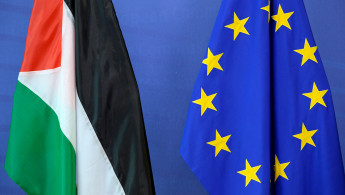Palestinian officials slam EU for delaying millions in aid over 'anti-Semitism' claims
Palestinian officials have slammed the European Union's decision to delay the transfer of 214 million euros in annual aid to the Palestinian territories, the Israeli newspaper Haaretz reported on Tuesday.
The freeze, proposed by the European Commissioner for Neighbourhood and Enlargement Oliver Varhelyi, who is from Hungary, was likened to Israeli far-right behaviour by senior Palestinian government officials.
Varhelyi advanced the proposal based on claims that Palestinian school syllabuses contain "antisemitic" material and "incit[es] hate".
The Hungarian diplomat apparently wanted to take advantage of the aid transfer delay to "leverage change" in Palestinian textbooks, following a German report on the issue, according to Haaretz.
One senior Palestinian official told Haaretz: "They talk to us about curriculums and human rights and promoting elections, but ignore the violations and daily conduct of Israel as a brutal occupying entity."
Some EU officials attempted to block Varhelyi's delay but failed in doing so. Defeating the proposal necessitates a 14-country majority.
Most of the aid - around 150 million euros - goes directly to the Palestinian Authority's budget, including salaries. The remainder of the aid is intended for projects, infrastructure renovations, and varying civil society projects.
Israel denied claims it tried to influence the Hungarian commission's decision and the EU's voting on the issue. It also reportedly maintained that the proposal was an internal European matter.
Palestinian Foreign Minister Dr. Riyad Al-Maliki met with Varhelyi in Antalya, Turkey over the weekend, and said that the Palestinian Authority does not accept such demands.
He added that Palestinian officials will continue making efforts to obtain a European majority for the proposal to be overturned.
In 2020, Palestinian civil societies rejected the European Union's conditional funding, which was based on an "anti-terror clause" that called for the societies to "vet" individuals, as a means to ensure that they are not affiliated with "terrorist groups".





 Follow the Middle East's top stories in English at The New Arab on Google News
Follow the Middle East's top stories in English at The New Arab on Google News
![The UAE is widely suspected of arming the RSF militia [Getty]](/sites/default/files/styles/image_330x185/public/2024-11/GettyImages-472529908.jpg?h=69f2b9d0&itok=Yauw3YTG)
![Netanyahu furiously denounced the ICC [Getty]](/sites/default/files/styles/image_330x185/public/2024-11/GettyImages-2169352575.jpg?h=199d8c1f&itok=-vRiruf5)
![Both Hamas and the Palestinian Authority welcomed the ICC arrest warrants [Getty]](/sites/default/files/styles/image_330x185/public/2024-11/GettyImages-2178351173.jpg?h=199d8c1f&itok=TV858iVg)